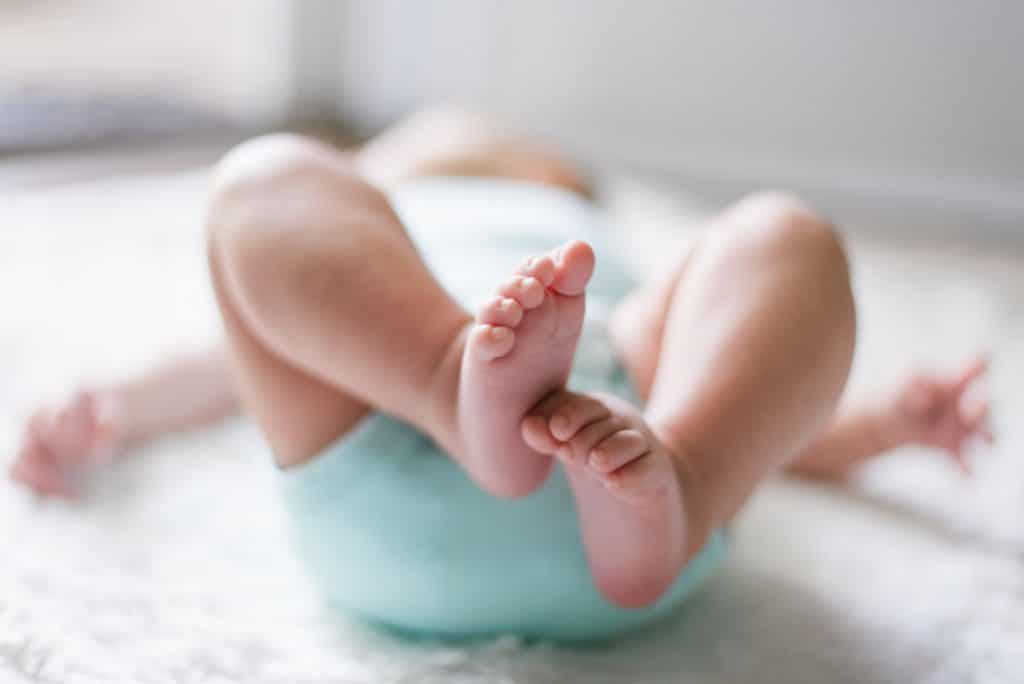It is one of the most common questions parents have about their sleeping children: what causes a child to shake while sleeping? Baby twitching while sleeping, the reason can be traced to a variety of reasons. Let us tell you that there’s no need to worry if your child occasionally jerks his feet or toes. In this article, we will talk about what are the infant leg shaking causes and is there anything to be worried about it?
In This Article
What exactly is this sleep twitching means?
Sleep twitching is a common condition in newborn babies. This is characterized by sudden jerky movements or spasms of limb muscles when a toddler is asleep. The twitching may occur a few times during the night. Although they can be disturbing to watch, they are considered normal for most babies. These sleep twitches are also called sleep myoclonus.
Generally, there are two types of myoclonus, one is positive and another one is negative. When a sudden muscle contraction leads to twitching it is positive myoclonus, whereas when muscle relaxation leads to twitching it is negative myoclonus.
What do studies say about baby twitching while sleeping?

When babies experience myoclonic twitches, it’s important to remember that they are normal. Although startling to watch, baby shaking while sleeping doesn’t mean anything is wrong with your child, they are just one of the many milestones on their journey from newborn to toddler. Some studies even conclude that these twitches help infants to develop coordinated movements. Babies are in the process of learning how to coordinate their movements and control their muscles, twitching is just an outward sign that this is taking place.
When a child twitches in sleep, what’s the reason?
In most cases, these reactions are ordinary phenomena and are not necessarily indications of a particular disease or any problem. Yet what is the reason for them and why do children twitch in their sleep. Let us know about infant leg shaking causes:
Development
Babies are known to have a common twitch in their bodies after they are born. Doctors believe that twitching is closely connected to the sensory development of newborn babies. As your baby develops, you may notice the twitching patterns change. In babies, twitches will often occur in short bursts separated by 10 seconds or less.
Nervous System Immature
Another shaking while sleeping causes can be an immature nervous system. Babies’ bodies are still developing after they are born – both inside and out. With every movement that a baby makes, the brain and the body are learning, adapting, and growing. As these signals travel through the spinal cord and to the different parts of the body, they become more refined with time.
Breast Milk Contains Caffeine
When you’re breastfeeding, you should limit your intake of caffeinated beverages such as coffee or sodas. This is because caffeinated beverages, especially coffee, can cause a baby to have tremors or jitter at night.
Startle Reflex
The startle reflex, also known as the Moro reflex, is a normal response babies exhibit when startled or frightened. Startling or other frightful occurrences are seen to cause an infant to respond with a quick extension of the upper limbs and opening of the mouth.
When to consult a doctor?
When a child twitches as he sleeps, you might be tempted for several reasons to consult a doctor. It might be confusing to conclude whether the baby twitching while sleeping is normal or something to be worried about. A common way to find out if there is an underlying medical concern behind baby shaking while sleeping is to check whether twitching stops immediately or not. When the baby wakes up and twitching stops it is harmless for babies. However, if twitching continues even when the baby is awake, it might be concerning.

If the baby is suffering from a twitching event when he or she is awake, seizures can be the cause. Here are some of the symptoms of seizures in baby:
- Unusual movements and behaviors in babies
- Changes in the baby’s facial expression
- Changes in respiration and heart rate are all noticeable
- Repeated twitching with the same duration
- Unable to stop shaking even after holding the baby
- Rhythmic movements of the body
Moreover, seizures issues in babies can be related to the following problems:
Febrile seizures
Children’s febrile seizures are the most prevalent type of seizure. They are usually brought on by a high fever caused by an infection. Symptoms include stiffening of muscles, the limbs may twitch or jerk, and the child’s eyes may rollback.
Infantile spasms
This rarer form of seizure usually occurs between 4-8 months of birth. Onset is usually with stiffening of the arms and legs, bending forward, and arching of the back.
Epilepsy
Epilepsy is a neurological disorder that causes seizures in children. It is one of the most frequent nervous system illnesses. It affects people of all races and ethnicities, including children and adults. Learn more about what is epilepsy and its early signs in children.
Benign familial neonatal seizures
Recurrent seizures in newborn newborns are a symptom of benign familial neonatal seizures (BFNS). Seizures commonly start around day 3 of life and last for 1 to 4 months. Seizures can affect only one side of the brain (focal seizures) or both sides.
Conclusion:
The first time a parent sees a strange twitching in their sleeping child they panic and worry about what possibly could be causing it. In most cases, the baby twitching while sleeping harmless and does not require medical attention. However, in some unfortunate cases, this condition might need medical attention. The most important thing to know is that there is no need to worry. Whether it’s the result of common development progress or a physical condition, there are ways to deal with the problem and have your child sleeping soundly through the night again.











